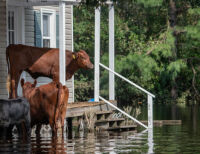
Professor of Data Science Steve Stern, The Centre for Data Analytics at Bond University
As a professor of data science and long-time educator of probability theory, I have a confession to make: I owe a certain debt of gratitude to lotteries as they provide a plethora of material for constructing examination questions.
If you’ve ever taken my class you should be readily able to demonstrate the widely reported odds of a single OzLotto Powerball ticket winning the jackpot as a staggering 134,490,399:1 against.
That number is more than five times the current population of Australia, let alone the population of ticket-buying age. So look, don’t feel bad, approximately nobody wins the lottery! And those odds change not a whit as the jackpot multiplies to ever-higher record amounts.
Further, in an ironic twist of human psychology, as the jackpot value increases, so does the volume of overall tickets bought, which means that even if you are double-struck by lightning (in fact, winning the lottery is about as likely as being hit by lightning 1.5 times!) and win the jackpot, the odds have also greatly increased that there will be other winners and you’ll have to split the bounty.
Australians love a punt. More than they should if I am being honest, but far be it from me to shuck a cultural tradition. But far too many of us not only enjoy a flutter, we also do not understand odds appropriately, or more importantly the way the gambling industry works.
As a sports fanatic, I watch with increasing queasiness the utter bombardment of sporting broadcasts with highly polished Hollywood-style mini-movie vignettes advertising sports betting companies and their smart phone apps touting ever easier ways to wager on more complex outcomes, both individually and now in groups (as if small groups of young males need more ways to engage in peer-pressured risky behaviour).
They have blanketed the sports airwaves so uniformly that all of them must end with the government-required admonishment to “gamble responsibly”, which my personal inner Babel fish always seems to translate as “bequeath to us only that portion of your personal fortune you won’t notice is gone when we take it from you”.
Contrast this with the also presumably government-required statement at the end of a superannuation advertisement, in the mellifluous voiceover tones of actor John Wood, that “past performance is not a reliable indicator of future performance”. This despite the fact the preceding presentation has just steadfastly demonstrated how much better off a person would have been if they did indeed use past performances as a model for future ones!
All of this should start to give us pause, I think, and hopefully encourage us to start finding ways to train our intuitions about the laws of chance and their idiosyncrasies.
Finally, if you are among the many OzLotto Powerball ticketholders who did not win the $160 million jackpot this week, know that you are not alone.
As I said, nobody wins the lottery. “Wait, surely someone wins occasionally”, I hear you say. Sure, occasionally, someone takes home the jackpot, and it’s fun to fantasize about what we’d do with all that money. But let me close by posing you this question: If you actually did take home the jackpot, ask yourself where (which is to say, who) all that money came from.















